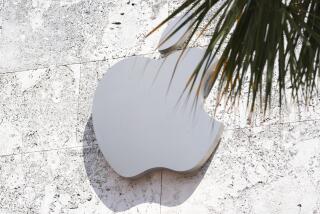Apple slips billions through loopholes of U.S. tax laws
- Share via
Apple, America’s richest, most innovative consumer technology company, is also the most creative in hiding billions of dollars in profits from the taxman, according to congressional investigators. But on Tuesday in testimony before the Senate Permanent Subcommittee on Investigations, Apple CEO Tim Cook pointed out that his company’s creative tax sheltering, far from being illegal, is made possible by the loophole-ridden tax laws of the United States.
Cook told the senators that Apple paid a $6-billion tax bill to the federal government last year. Not only does Apple pay everything owed to the IRS, Cook said, the company does not employ gimmicks to avoid required tax payments.
The subcommittee chairman, Sen. Carl Levin (D-Mich.), differed with that last point. “The company’s engineers and designers have a well-earned reputation for creativity,” Levin said. “What may not be so well-known is that Apple also has a highly developed tax avoidance system — a system through which it has amassed more than $100 billion in offshore cash in a tax haven.”
According to congressional investigators, Apple has developed an overseas network of obscure subsidiaries that are run by executives in Apple’s Cupertino headquarters, often with no employees in the locations where they are technically based. For the most part, the subsidiaries do not exist for any other reason than to have huge chunks of corporate earnings assigned to them on paper, thus making it possible for Apple to keep that money outside the reach of the IRS. One Irish subsidiary has paid almost zero tax on $30 billion in profits since 2009, according to investigators.
Before the hearing, Sen. John McCain (R-Ariz.) said, “Apple claims to be the largest corporate taxpayer, but by sheer size and scale, it is also among America’s largest tax avoiders.” When he was face to face with Cook, he said Apple had violated the spirit, if not the letter, of the law.
McCain’s fellow Republican Sen. Rand Paul of Kentucky took exception to the bullying tone of his colleagues. “What we’re talking about is what every company in America does, and that’s minimizing their tax,” Paul said. He asserted that the real culprit was “the awful tax code” and that “Congress should be on trial” for failing to fix it.
Stated more gently, that was Cook’s ultimate point as well. He called for a lowering of the corporate tax rate and a simplification of the law. Such changes would likely mean Apple would end up paying more in taxes, Cook told the senators.
Cook may have a good idea, but it is preposterous to think the current dyspeptic Congress will get past its dysfunction and find common ground on the best way to reform the tax code. Too much ideology and too many lobbyists stand in the way. As a result, Apple and every other American corporation will continue to slip through the gaps in the outmoded law with big bags of cash bound for foreign lands.
More to Read
A cure for the common opinion
Get thought-provoking perspectives with our weekly newsletter.
You may occasionally receive promotional content from the Los Angeles Times.







